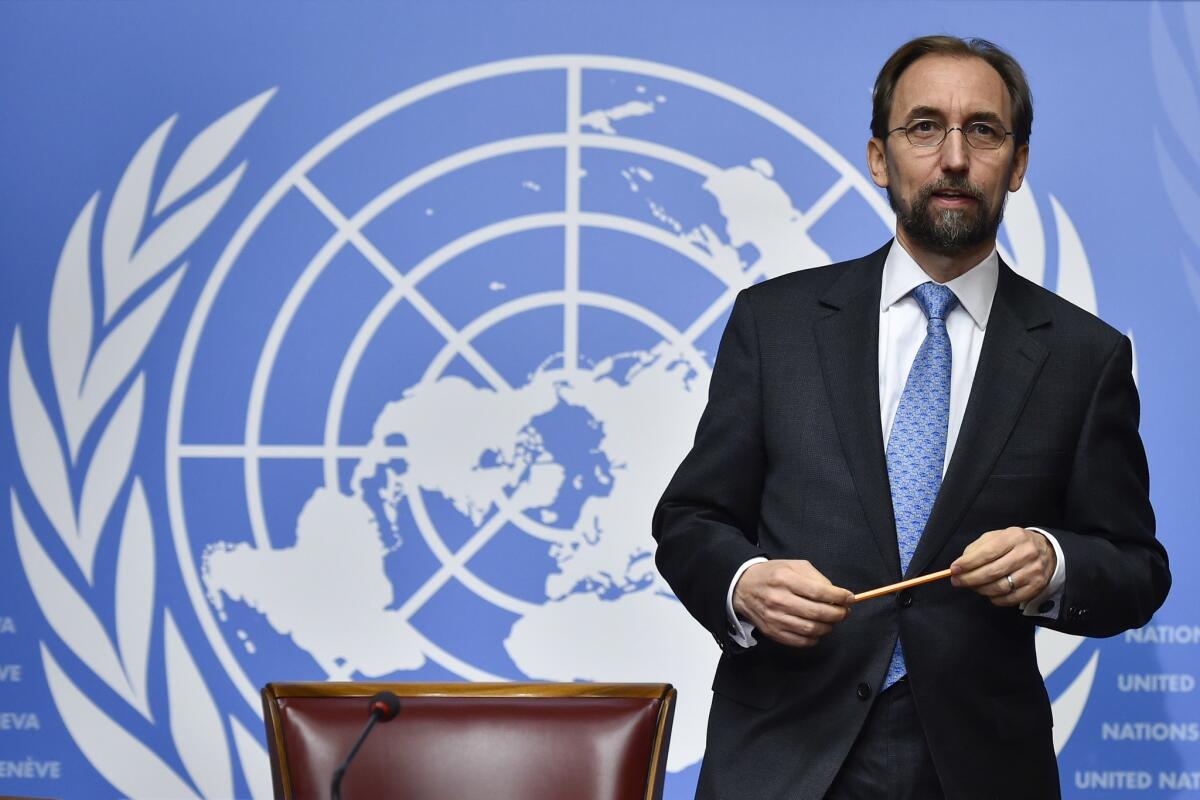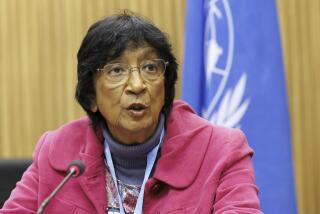Kidnappings, sex abuse, torture: U.N. details likely war crimes in Sri Lanka

United Nations High Commissioner for Human Rights Zeid Raad Hussein called for a hybrid court to punish perpretrators who carried out mass atrocities against Tamil civilians during Sri Lanka’s civil war.
- Share via
reporting from Mumbai, India — Detailing “horrific levels” of violence and likely crimes against humanity in Sri Lanka’s long civil war, the United Nations’ human rights commissioner on Wednesday called for a special court with international prosecutors and judges to investigate and punish perpetrators.
The recommendations came as the U.N. human rights body released a long-awaited, 261-page report into alleged atrocities in the 26-year civil war, which ended in 2009 with tens of thousands dead.
The U.N. report, the product of more than six years of investigation, did not name individual perpetrators but found “a consistent pattern” of organization and planning that indicated international laws of war were violated, particularly by government forces but also by ethnic Tamil rebels who fought to establish an independent homeland in the north of the island nation.
The report adds to an intense debate in Sri Lanka, where a new, U.S.-backed government took power this year and has pledged to launch domestic investigations of wartime abuses. President Maithripala Sirisena’s administration opposes any international inquiry, fearing it could destabilize the country with prosecutions of powerful political figures.
In omitting names, the report spared former President Mahinda Rajapaksa, whose government is widely blamed for carrying out mass atrocities, mainly against Tamil civilians, as it crushed the rebellion in 2009.
But the report found “reasonable grounds” to believe Rajapaksa-led security forces carried out unlawful killings, abductions, torture, sexual violence and other abuses “to humiliate and punish” people suspected of connections to the rebels.
It also found evidence that Tamil Tiger rebels forcibly conscripted civilians, including children, especially as their numbers dwindled at the end of the conflict.
The U.N. human rights commissioner, Zeid Raad Hussein, called for the establishment of a hybrid special court that would include Sri Lankan and international judges, prosecutors and investigators.
Hussein said Sri Lanka’s previous efforts to investigate alleged war crimes, mainly under Rajapaksa’s government, were not independent and could not guarantee the safety of victims and witnesses. The Sri Lankan justice system faces a huge challenge in taking on the powerful security forces, which continue to enjoy impunity and have not been withdrawn from northern Sri Lanka in the six years since the war ended, the report said.
“It is, I believe, an inescapable reality that Sri Lanka’s criminal justice system is not yet ready to handle these types of crimes,” Hussein said in a news conference in Geneva.
“A purely domestic court procedure will simply not succeed in overcoming the widespread and justifiable suspicions fueled by decades of violence, malpractice and broken promises.”
Sri Lanka’s government issued a cursory response, saying it would “ensure that its content as well as recommendations receive due attention of the relevant authorities.”
Namal Rajapaksa, a lawmaker and the former president’s son, called the U.N. proposal “a complete insult to the entire legal system in this country.”
“Sri Lanka is fully capable of conducting any domestic inquiry that may be needed and should be allowed to proceed without foreign interference,” he said in an interview.
Sri Lankan officials earlier this week pledged to form a truth and reconciliation commission and special offices dedicated to reparations for war victims and claims of thousands of missing persons, many believed to have been abducted by government forces.
The truth commission would seek advice from South Africa, which set up such a commission in the 1990s to investigate apartheid-era abuses, while the missing persons office would be set up with “expertise” from the International Committee of the Red Cross, Foreign Minister Mangala Samaraweera told a meeting of the U.N. human rights council.
“Today we have a government in place which acknowledges the suffering of victims across Sri Lanka’s communities, a government which recognizes the mistakes of the past and is all too aware of the weaknesses of our institutions,” Samaraweera said.
The government received a boost from the Obama administration last month when Assistant Secretary of State Nisha Desai Biswal said in a visit to Colombo, “We fundamentally support efforts to create a credible domestic process for accountability and reconciliation.”
The statement reflected U.S. eagerness to support the new government, which has sought to repair relations with the U.S., India and other allies who were alienated by the previous government’s tilt toward China.
After Sirisena unseated Rajapaksa in an election upset in January, the Obama administration pushed for the U.N. report, originally due to be released in April, to be delayed by six months in order to give the new government space to begin reforms.
But analysts said the government’s plans for a domestic accountability mechanism still lacked specifics, including how investigations and prosecutions would be conducted, and what role the U.N. and other international experts might play.
“With such deeply institutionalized impunity, and ongoing violations and pressure on witnesses even now, no domestic process can be credible without a substantial international component,” said Alan Keenan, an analyst with the International Crisis Group.
In northern Sri Lanka, many Tamil families say an international probe is their only hope of resolving the mystery of wartime abductions.
As of June, a government commission on missing persons had received nearly 17,000 complaints of missing civilians. Many are feared dead, although some families believe their loved ones may still be languishing in secret detention facilities whose existence has never been proved.
“We are hearing the same promises from the new government since January, and they so far have not created a single mechanism to take these issues forward,” said Suresh Premachandran, a leading Tamil politician. “The commission on missing persons has not found even a single person. How can you put trust in the government?”
Special correspondent Munza Mushtaq contributed to this report from Colombo, Sri Lanka.
For more news from South Asia, follow @SBengali on Twitter
ALSO
North Korea threatens U.S., says nuclear plant resumed operations
In Japan, protests intensify as vote nears on ‘war bills’
Los Angeles, Beijing agree on plan to promote clean air as part of Obama-Xi deal
More to Read
Sign up for Essential California
The most important California stories and recommendations in your inbox every morning.
You may occasionally receive promotional content from the Los Angeles Times.













